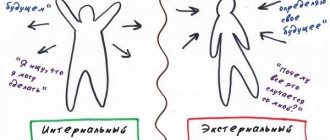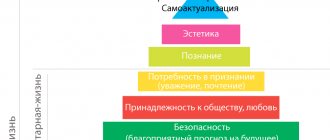Description of the technique
USK methodology
(level of subjective control) has become most widespread in our country, the authors of which are E. F. Bazhin, E. A. Golynkina, L. M. Etkind.
This technique is based on the concept of locus of control by J. Rotter. However, Rotter considers the locus of control to be universal in relation to any type of situation: the locus of control is the same in both the sphere of achievements and in the sphere of failures. When developing the USC methodology, the authors proceeded from the fact that sometimes not only unidirectional combinations of locus of control are possible in situations of different types. This position also has empirical confirmation. In this regard, the developers of the test proposed to identify subscales in the locus of control diagnostic methodology: control in situations of achievement, in situations of failure, in the field of industrial and family relations, in the field of health.
In total, the USC questionnaire consists of 44 items.
In order to increase the reliability of the results, the questionnaire is balanced according to the following parameters:
1) according to internality-externality
- half of the questionnaire items are formulated in such a way that people with internal USC will give a positive answer to them, and the other half are formulated in such a way that people with external USC will give a positive answer to them;
2) by emotional sign
— an equal number of questionnaire items describe emotionally positive and emotionally negative situations;
3) in the direction of attributions - an equal number of points are formulated in the first and third person.
Unlike the Rotter scale, the questionnaire includes items measuring internality-externality in interpersonal and family relationships. For medical and psychological studies, it includes items measuring USC. regarding illness and health.
To increase the range of possible applications of the questionnaire, it is designed in two versions, differing in the format of the respondents’ responses.
Option A
, intended for research purposes, requires a response on a 6-point scale “-3, -2, -1, +1, +2, +3”, in which the response “+3” means “strongly agree”, “-3” - “completely disagree” with this point.
Option B
, intended for clinical psychodiagnostics, requires answers on a binary scale “agree - disagree.”
As studies conducted on normal subjects—students—have shown, responses to all points of the questionnaire have a sufficient spread: none of the halves of the scale was chosen less than 15% of the time. The results of filling out the questionnaire by an individual subject are converted into a standard system of units and walls and can be visually presented in the form of a profile of subjective control.
The indicators of the USC questionnaire are organized in accordance with the principle of the hierarchical structure of the activity regulation system in such a way that they include a generalized indicator of individual USC, invariant to frequent situations of activity, two indicators of the average level of generality, differentiated by the emotional sign of these situations, and a number of situation-specific indicators . Procedure Instructions
Read each of the statements below carefully and mark on your answer sheet:
- -3 – completely disagree
- -2 – partially disagree
- -1 – rather disagree than agree
- +1 – more likely to agree than to disagree
- +2 – I partially agree
- +3 – I completely agree
Formation mechanism
The formation of one or another type of locus of control and its evolution are influenced by a number of factors: the individual characteristics of a person, the conditions of upbringing, the state of the society in which he lives, the historical moment and much more. Under their influence, the individual develops one of the following attitudes: “Nothing depends on me” (passive position), “Everything in life depends only on me” (active position of the master of fate).
In 1954, Rotter proposed that attitude choice was related to how often an individual was exposed to praise and punishment. If in response to his actions he received a negative reaction, experienced unpleasant emotions, felt negative consequences, or the actions did not bring the expected result, then he will form the belief “I don’t decide anything.”
Thus, education plays a large role in the formation of locus of control. Children from authoritarian families with inconsistent parental behavior develop an external type of control. From early childhood they are accustomed to obeying and going with the flow. Children from families with a democratic upbringing style and consistent parental behavior develop an internal type of responsibility.
Upbringing, state of society, era influence the type of responsibility
However, it is important to remember that locus of control develops and changes throughout life. At any moment, the subject, if he wants, can change his fate
Processing the results
The results are processed in several stages:
1. Using the key, “raw” points are calculated for each scale:
The number corresponding to the choice determines the number of points received for each answer. In this case, points for answers to questions with a “+” sign are summed up with their sign, and for questions with a “–” sign - with the opposite sign.
Key
| Scale | «+» | «–» | Σ |
| And about | 2; 4; 11; 12; 13; 15; 16; 17;, 19; 20; 22; 25; 27; 29; 31; 32; 34; 36; 37; 39; 42; 44 | 1, 3, 5, 6, 7, 8, 9, 10, 14, 18, 21, 23, 24, 26, 28, 30, 33, 35, 38, 40, 41, 43 | |
| Eid | 12; 15; 27; 32; 36; 37 | 1; 5; 6; 14; 26; 43 | |
| In | 2; 4; 20; 31; 42; 44 | 7; 24; 33; 38; 40; 41 | |
| Is | 2; 16; 20; 32; 37 | 7; 14; 26; 28; 41 | |
| IP | 19; 22; 25; 31; 42 | 1; 9; 10; 24; 30 | |
| Them | 4; 27 | 6; 38 | |
| From | 13; 34 | 3; 23 |
2. “Raw” points are converted (Σ) into walls.
Table for converting raw scores into standard scores
| Walls | "Raw" points | |||||||||||||
| io interval | ID interval | In interval | Is interval | IP interval | Im interval | From interval | ||||||||
| from | before | from | before | from | before | from | before | from | before | from | before | from | before | |
| 1 | -132 | -14 | -36 | -11 | -36 | -8 | -30 | 12 | -30 | -5 | -12 | -7 | -12 | -6 |
| 2 | -13 | -3 | -10 | -7 | -7 | -4 | -11 | -8 | -4 | -1 | -6 | -5 | -5 | -4 |
| 3 | -2 | 0 | -6 | -3 | -3 | 0 | -7 | -5 | 0 | 3 | -4 | -3 | -3 | -2 |
| 4 | 10 | 21 | -2 | 1 | 1 | 4 | -4 | -1 | 4 | 7 | -2 | -1 | -1 | 0 |
| 5 | 22 | 32 | 2 | 5 | 5 | 7 | 0 | 3 | 8 | 11 | 0 | 1 | 1 | 2 |
| 6 | 33 | 44 | 6 | 9 | 8 | 11 | 4 | 6 | 12 | 15 | 2 | 4 | 3 | 4 |
| 7 | 45 | 56 | 10 | 14 | 12 | 15 | 7 | 10 | 16 | 19 | 5 | 6 | 5 | 6 |
| 8 | 57 | 68 | 15 | 18 | 16 | 19 | 11 | 13 | 20 | 23 | 7 | 8 | 7 | 8 |
| 9 | 69 | 79 | 19 | 22 | 20 | 23 | 14 | 17 | 24 | 27 | 9 | 10 | 9 | 10 |
| 10 | 80 | 132 | 23 | 36 | 24 | 36 | 18 | 30 | 28 | 30 | 11 | 12 | 11 | 12 |
3. The received assessments within the walls are entered into the table:
Final table of results
The results can also be presented as a graph or as a profile.
Example graph
Example profile
Locus of control and personality maturity
The internal type is considered a trait of a mature personality. Subjects are indifferent to the opinions of others, they analyze the information they receive, soberly assess their abilities and actions, and strive to constantly improve their position. However, the feeling of “I can do anything” is not always useful. That's why we need a golden mean.
A person should set realistic goals and not try to change what is truly beyond his control. Otherwise, it is fraught with disappointment, frustration, and depression. In addition, the general state of society must be taken into account. If the overall situation is unstable, then you should not make grandiose plans for the future.
Interpretation of results
Analyze quantitatively and qualitatively your USC indicators on seven scales, comparing your results (the resulting “profile”) with the norm. Deviation to the right (> 5.5 walls) indicates an internal type of control (ITC) in appropriate situations. Deviation to the left from the norm (<5.5 walls) indicates the external type of USC.
Description of scales
- General internality scale (Io).
A high score on this scale corresponds to a high level of subjective control over any significant situations: internal control, internal personality. Such people believe that most of the important events in their lives are the result of their own actions, that they can control them, and thus they feel their own responsibility for these events and for how their lives turn out in general. Generalization of various experimental data allows us to speak of internals as more self-confident, calmer and more benevolent, and more popular in comparison with externals. They are distinguished by a more positive system of attitudes towards the world and a greater awareness of the meaning and goals of life. - A low score on this scale corresponds to a low level of subjective control: external control, external personality. Such people do not see the connection between their actions and the events of their lives that are significant to them, and do not consider themselves capable of controlling their development. They believe that most events in their lives are the result of chance or the actions of other people. Generalization of various experimental data allows us to talk about externals as people with increased anxiety and concern. They are distinguished by conformity, less tolerance towards others and increased aggressiveness, less popularity in comparison with internals.
- Achievement Internality Scale (Id).
High scores on this scale correspond to a high level of subjective control over emotionally positive events and situations. Such people believe that they themselves have achieved all the good things that have happened and are in their lives, and that they are able to successfully pursue their goals in the future. - Low scores on the scale indicate that a person attributes his successes, achievements and joys to external circumstances - luck, good fortune or the help of other people.
- School of internality in the field of failures (In).
High scores on this scale indicate a developed sense of subjective control in relation to negative events and situations, which is manifested in a tendency to blame oneself for various troubles and suffering. - Low scores indicate that a person tends to attribute responsibility for such events to other people or consider them the result of bad luck.
- Internality scale in family relationships (Is).
High scores mean that a person considers himself responsible for the events occurring in his family life. - Low ones indicate that the subject considers not himself, but his partners, to be the cause of significant situations that arise in his family.
- Scale of internality in the field of production relations (Ip).
High indicators also indicate that a person considers his actions an important factor in organizing his own production activities, developing relationships in the team, his advancement, etc. - Low ones indicate that a person is inclined to attribute more importance to external circumstances - management, workmates, good luck or bad luck.
- Internality scale in the field of interpersonal relations (Im).
High scores indicate that a person considers himself responsible for building interpersonal relationships with others. - Low ones indicate that a person tends to attribute more importance in this process to circumstances, chance, or the people around him.
- Internality in Health and Illness Scale (Iz).
High rates indicate that a person considers himself largely responsible for his health: if he is sick, he blames himself for it and believes that recovery largely depends on his actions. - A person with low scores on this scale considers illness and health to be the result of chance and hopes that recovery will come as a result of the actions of other people, especially doctors.
For professional diagnostics, the most informative are the results on the scale of internality in industrial relations (IP). Results on other scales make it possible to construct a multidimensional profile. Since most people are characterized by more or less wide variability in behavior depending on specific social situations, the characteristics of subjective control can also change in a person depending on whether the situation seems complex or simple, pleasant or unpleasant, etc.
The level of subjective control increases as a result of psychological correction. It should be remembered that internals prefer non-directive methods of psychological correction; and externals, as individuals with increased anxiety and prone to depression, are subjectively more satisfied with behavioral methods.
Types of people and locus of control
Psychologists have found that this property is interconnected with self-esteem. During the experiment, psychologists found that the higher a person’s self-esteem, the more acutely his internal control is developed. At the same time, the opposite is true: the more developed internal control, the more self-esteem increases. Both components are directly related to a person’s self-awareness, that is, his ideas about himself.
Subjects of one type or another differ from each other.
Features of the internal:
- takes responsibility for all his reactions;
- free from the opinions of others;
- values himself highly, is self-sufficient;
- lives in harmony with himself;
- psychologically stable;
- focus on results.
As a rule, these are healthy, successful, happy people. They are characterized by goodwill and a positive perception of the world.
Here is what is typical for a person with an external locus of control:
- they deny their mistakes, do not try to understand them and work on themselves;
- do not believe in themselves, do not know their potential;
- feel helpless;
- depend on outsiders;
- psychologically unstable;
- give up at the first failure.
As a rule, they are haunted by a feeling of hopelessness. They are unhappy, often get sick, and are not happy with their lives. They are characterized by conformity, aggression, suspicion, and anxiety.
How else do internals differ from externals?
- the former look to the future, the latter are fixated on the past;
- the former treat difficulties with humor and see opportunities in obstacles, the latter are afraid of everything new, unknown, and difficult;
- the former always defend their opinion, the latter cannot defend their principles and beliefs;
- the former always make plans and set goals, the latter never plan anything, are characterized by irresponsibility, delaying the implementation of something;
- the former are accustomed to working and can sacrifice pleasure, the latter prefer to live one day at a time;
- the former imagine their future as bright, filled with events, the latter – uninteresting, monotonous;
- For the first, time goes quickly, for the second - slowly;
- the former are very attentive to their time, the latter do not know how to organize and manage it productively;
- the former respect themselves, expect happiness, good luck, love, the latter do not respect themselves, they are sure that nothing good awaits them in the future.
Eternals more often suffer from maladaptation and face psychological, somatic and psychosomatic problems. They live without meaning or purpose.
Interesting experiments
Such a locus of personal control allows a person to defend and protect his interests, from everyday everyday events to participation in political actions. To illustrate, we present the results of another experiment by J. Rotter.
The respondents were college students who were active participants in various movements fighting for civil rights. The results were expected, because among these people the majority had an internal locus of control.
An interesting experiment is about the dangers of smoking. Participants were given information on the packs about the negative effects of cigarettes (the study was conducted in the 60s of the 20th century). After such a message, the internals tried to quit smoking, but the externals relaxed and let everything take its course - come what may. Individuals with an external locus of control counted on help from doctors, magic pills, and fate, but did nothing themselves to change their condition.
History of creation
Rotter's social learning theory appeared in the mid-1950s and was finally formed within 20 years. It arose in the context of American science aimed at positive knowledge. True, Adlerian psychology, focused on the social determinants of behavior, had a great influence on the choice of value bases. So, for example, axioms appeared: psychology should study the individual in the context of the surrounding world that is significant for him (axiom 1); personal constructs cannot be reduced to constructs of other sciences (axiom 2). But the influence of E. Tolman’s psychology, oriented towards the natural science approach, turned out to be stronger. This is reflected in the following axioms: behavior is purposeful and depends on reinforcement (axiom 6); goal orientation is determined by anticipation based on the experience of existing actions (axiom 7). At the same time, the neo-behaviourist tradition manifests itself in the theory of social learning and as a certain standard of scientificity, prescribing a strict formalization of initial concepts. Therefore, moving from methodological postulates to the construction of a theoretical model, Rotter tries to derive complex, “molecular” forms of behavior, which are targeted by social or clinical psychology, from elementary simple, “molar” ones, reproducible under regulated experimental conditions.
The main task of Rotter's theory is to predict behavior in a situation of choice from clearly defined alternatives. In accordance with the first concept of the theory, in a situation of choice, the action whose “behavioral potential” is higher will be implemented. The “behavioral potential” itself appears as the integration of two components: the subjective probability of reinforcement after an action, or “expectation,” and the subjective “value” of this reinforcement.
Then, trying to analyze these components and moving on to consider “value,” Rotter goes to the level of “molecular” forms of behavior. The “value” of the result of an action is expressed in the integration of the “value” of the action itself and the “value” of the consequences accompanying it.
But the author of the theory of social learning focuses on the deployment of the concept of “expectation”, which gives the following formalization: the subjective probability of an event occurring in a certain situation appears as the sum of a “specific expectation” determined by the experience of interaction with similar situations, and a “generalized expectation” based on experience solving a wider range of problems. At the same time, the role of “generated expectation” in the new situation will be decisive; in a typical situation, on the contrary, a “specific expectation” is realized, formed by the experience of interaction with this type of situation.
Rotter does not introduce concepts that would create a context for the concepts of “values” and “expectations”, for example: “dynamics of the motivational-need sphere” or “Self-concept”. This leads to the fact that a number of empirical data begin to contradict his theory. In particular, “values” and “expectations”, considered by him as independent, in fact turn out to be interrelated: with failure, the “value” of the goal decreases due to the association with unpleasant emotions. X. Heckhausen sees in this the fundamental limitations of non-situational (generalized) constructs in general compared to situation-specific ones, which raises some doubts in us. A possible solution to the issue under consideration is to describe “generalization” as a qualitative process that occurs along with the development of personal structures. For Rotter, generalization is a linear, quantitative process in which a series of experiences are generalized, so this concept remains purely descriptive for him, without experimental justification and not related to the mechanisms of creating the self-concept.
Why know this?
What practical meaning can be derived from this knowledge?
Indeed, at first glance it may seem that the theory is informative and interesting, but nothing more. In fact, determining your locus of control and reconsidering your attitude towards what is happening to you is a powerful tool for self-development. A superficial analysis can be carried out even without seeking help from the mentioned questionnaires and tests based on them on the Internet. Just try to look at yourself from the outside and evaluate your attitude towards what happened in the near future. For example, you received a D on a test or your boss yelled at you for doing a bad job. What were your next steps? Did you conscientiously learn everything and correct mistakes in your work, because what happened was your fault? Or, cursing the teacher and boss for bias and injustice, did what was necessary “under the lash” just to be left alone? Of course, such options are not mutually exclusive, but in other cases they are less clearly related to locus of control.
Thus, by choosing the right series of questions and answering them honestly, you will receive a ready-made map that can indicate in which direction you should move next and which skills and qualities of your character to develop and which to get rid of. Expressed externality indicates that you need to learn to take responsibility, be more confident and proactive. Establish observation of yourself and everything that happens, learn to see your trace, and not just a coincidence.
Internals should ask themselves similar questions. Their reaction to a shift in locus should be to refuse to control things that do not need control. It is worth recognizing that it is impossible to foresee absolutely everything, much less influence it. Therefore, reproaching yourself every time something goes wrong is a stupid idea and promises depression. Seek harmony!
Locus of control and its types
We have already mentioned that the locus of control can be external and internal, now we will consider these types in more detail. Beyond that, you're probably wondering if there's something in between. For example, this type is when an individual understands that he influences almost everything, but he is not omnipotent, and sometimes cannot influence external conditions. Yes, there is such a type. We'll talk about that too.
External (external) locus of control
This is faith in external conditions. Individuals with this type believe that everything has long been predetermined, that they do not decide or influence the present, much less the future. What we started was a success - the stars aligned successfully. Constantly haunted by failures - born under a leper star. Etc. They shift responsibility to outsiders, the universe, higher powers, etc. Roughly speaking, they will always find someone to blame. Such individuals are called externals.
Internal locus of control
Such people are sure that only they manage and control their lives. Their energy is directed inward. The subject always looks for the reason within himself, analyzes his actions, abilities, and possibilities. He only praises or criticizes himself, not other people, karma, the universe or anything else. Such individuals are called internals.
By this type, psychologists most often mean something in between. The internal locus of control assumes that a person is aware of certain “errors” in the external world; he is ready to accept what he cannot change. However, he takes an active position in this too. This is not about patience, humility, suppression. It's about changing attitudes. As they say, if life gives you lemons, make lemonade. That's what we're talking about. There is no absolutely pure type; there is always a combination.









